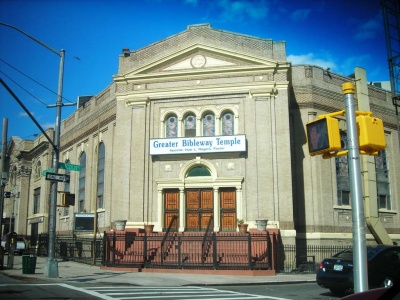Crown Heights: What's Real
From Decoding New York
| Introduction |
| Brighton Beach |
| * Evolution |
| * What's Real |
| * Here v. There |
| * Economy |
| Crown Heights |
| * Evolution |
| * What's Real |
| * Here v. There |
| * Economy |
| Comparison |
| * Photo Gallery |
| * Sources
|
Walking through the streets of Eastern Parkway, you can hear various languages spoken and you are able to obtain a sense of what it could feel like to walk a mile in the shoes of those who reside here. Obtaining a peek into the lives of the Hasidic Jews and the Afro-Caribbeans during the many trips we took to Crown Heights, we were able to observe their lifestyles. The residents of Albany Avenue and Utica Avenue opened up a new world to us considering we have never been to Crown Heights.
Along Albany Avenue, we noticed that the Hasidic Jews walk in clusters of about three to five people whether they are walking back from Yeshiva on Sundays or going about their daily lives. Nearly everyone seems to walk in a group regardless of their age, gender and destination. Going about their common routines, those we observed were conversing with each other in English and there were very few people that we noticed were speaking in Hebrew with one another. Generally, Jews speak Hebrew with one another regardless of where they emigrated. Those who emigrated from Poland usually speak Yiddish and not Hebrew. However, people who we interviewed stated that they spoke in Hebrew even if they did not emigrate from Israel. Furthermore, while driving in their cars, many Hasidic Jews listened to songs that were sung in Hebrew, which goes to show how culturally proud they are to be Jewish. As the sun was setting on a Friday and Shabbat was dawning, many were in a rush to hurry back home to prepare food and other arrangements. Stores began closing by three o’ clock and once Shabbat started the streets were absolutely deserted as if no one existed.
Each ethnic group has its stereotypes about them. Rabbi Joseph Epstien states, “Crown Heights may seem like an intimidating place for outsiders, considering the large population of Hasidic Jews, it is a especially intimidating for those of us who are contemporary Jews because there is a sense that these highly religious people look upon us as misfits and even fakes when rather we are a wholesome and warming community like a utopian oasis.” Upon first entering Crown Heights, I was under the impression that stereotypes are just misconception that many follow to simply label a community in which its members follow a different culture that stands out. However, while interviewing a Hasidic man, I found myself trying to validate to him that I was Jewish since he was less receptive to answer a series of questions. After trying to prove that I am a conservative Jew who is a member of the Chabad of Roslyn, the man coincidentally knew the Rabbi of the Chabad and stated to me that I was “Jewish on the inside not on the outside.” Outraged by the comment, I was unaware that even though I was not orthodox and I did not wear a long sleev shirt and long skirt that I could not be considered Jewish. In my opinion, I consider myself to be just as much a Jew as the man standing before me even though I may not follow the laws of Judaism to the severity that the man standing before does. This interview showed that stereotypes can in fact be true. I was not as welcomed simply because I looked like an outcast in the community from wearing jeans and a sweater.
In comparison to the Hasidic Jews, the Afro-Caribbeans were more welcoming as I was walking through Utica Avenue and conducting interviews. During an interview with a vitamin shop owner, he seemed genuinely interested in the website being designing and wanted to know more about it. Through our observations, I was able to notice how close the residents of the Afro-Caribbean community are with one another. Entering the Golden Krust Caribbean Bar and Grill restaurant, I noticed that the workers were speaking to the customers on a first name basis, even in other smaller stores such as the Avocado Nutrition store. A majority of the stores along Utica Avenue are Caribbean stores that hire Afro-Caribbeans as employees. While walking along Utica Avenue, you hear a mix of people talking in English with Caribbean accents as well as though speaking without any accents. In addition, you can hear people listening to Caribbean and reggae music in their cars as they are driving past.
Interviews with the locals of Crown Heights

